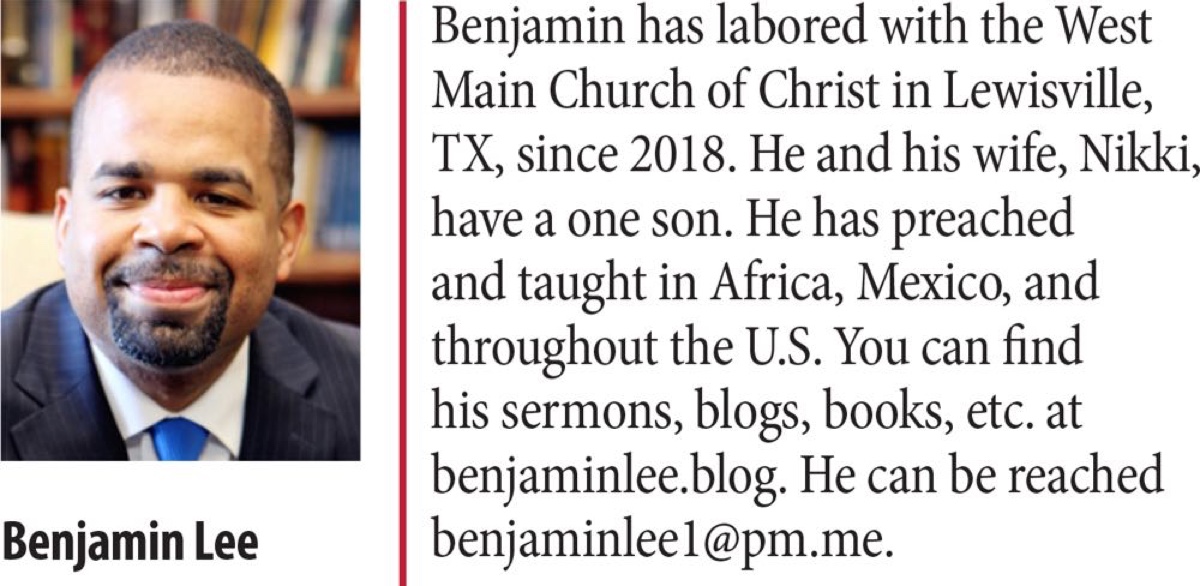By Benjamin Lee
Synopsis: It’s possible to reach the unchurched through casual contact, being different from the world, making worship a priority, and interacting with visitors in the right way.
In 2017, while preaching in Southeast Texas, I was reminded about the great love and generosity of God’s people! Our congregation had been hit hard by Hurricane Harvey. At least thirty members lost their homes. Despite the devastation, all was not lost. God’s people reached out from all around the country to assist. Money was given from individuals and churches. Christians travelled from around the country to help us rebuild. Brethren at our congregation sacrificed time, energy, and money to help the saints. Sometimes people ask, “Why do I need to be a part of a local congregation? Why can’t I just do Christianity by myself?” What I witnessed in 2017 was a powerful reminder of why! Christians need one another. Many Christians were hurt because of the storm—not physically, but emotionally and mentally. Members were weary and discouraged. The church became a place of comfort and encouragement for them. We sang, prayed, cried, and rebuilt houses together. That’s how it’s supposed to be. Brethren helped those who were weak and fainthearted (1 Thess. 5:14). Our elders tended to the flock both physically and spiritually.
In Acts 2, we see when and where the church was established. We also see what the church actually is. The church isn’t brick and mortar, it’s not a fancy auditorium, but people who have been called out of darkness into God’s marvelous light through obedience to the gospel (1 Pet. 2:9; Acts 2:38). The church that Jesus established is not to be an afterthought (Matt. 16:18). Those in the body of Christ serve Christ as King! It’s hard to imagine what 2017 would have been like without the church.
When we say “unchurched,” we are referring to those who do not generally attend or are part of a congregation. These individuals have little interest in being a part of a local congregation. In a 2014 article, the Barna Group said this concerning the unchurched:
Today’s unchurched are much less likely to come from a church background than ever before. Furthermore, unchurched people today have different expectations of church involvement from those of previous decades. These changes are the result of shifting personal attitudes as well as significant changes in the broader cultural landscape. In other words, in spite of our “Christian” self-descriptions, more than one-third of America’s adults are essentially secular in belief and practice. If nothing else, this helps explain why America has experienced a surge in unchurched people—and presages a continuing rise in this population.
Reaching the unchurched is not rocket science! The Bible gives us the answers. Let us consider the importance of. . .
In the book “The Patient Ferment of the Early Church,” author Alan Kreider spoke about how the church grew after the first century. He said, “How then did the church grow? Scholars have seen the church’s growth as coming about in innumerable ways through the translocal networks of family and profession in which most people participated. Masters interacted with slaves; residents met neighbors; and above all, believers networked with relatives and work colleagues. In all these relationships, ‘affective bonds’ were formed.”
Someone may read this and ask, “Is it really that simple? Yes, it really is that simple! Consider the stories of Lydia and the Philippian jailer (Acts 16:13, 25-34). In the first century, many families came to Christ through casual contact with believers. My son is taking Jiu Jitsu. A man from out of town recently visited the gym to sign up for classes. We had a casual conversation. Eventually, he shared with me how he’s been struggling with alcoholism for several years. I shared some Bible passages with him. We exchanged numbers and we’re looking to study the Bible together. This is the idea of casual contact. Similar opportunities arise every day and everywhere. So, what are we to do when such casual contact opportunities arise?
First, we must care enough to see them. Sometimes Christians care more about politics and a person’s political party affiliation instead of his soul. Second, we must open our eyes daily to see such doors of opportunities (John 4:35). Third, we must open our mouths. This is what Philip did in Acts 8. He asked the eunuch a question, “Do you understand what you are reading?” The Eunuch responded positively. He would later be converted. It’s not shocking to see statistics showing the most effective way of reaching the unchurched is by personally inviting people to attend worship services. A simple invitation will go a long way. Remember how Philip replied to Nathanael: “Can any good thing come out of Nazareth?” Philip said to him, “Come and see” (John 1:46). So, what can we say when opportunities arise through casual contact? Here are a few suggestions:
“I would love for you to come with me to worship this Sunday. Are you interested?”
“My congregation is having a special study on strengthening our marriages. Do you have any interest in studying with us?”
“How can I pray for you today?”
“Our congregation has been such a blessing to us with the support and love we’ve received.” Do you worship anywhere?
Paul opened his eyes and mouth while in Athens (Acts 17). Some sneered. Others said they would hear him again. A few joined him and believed. This is what will happen today. Some will mock when we share with them the gospel. Others will say maybe. Some will say, “I must obey.” How will we know unless we open our mouths?
Fourth, we must open our Bibles (Rom. 10:17). We must teach people God’s word. They need to learn the gospel. Most people have a misunderstanding about Christ and His church. Therefore, we must show them what Christ has to say about His church. People need to learn that the church is not made up of perfect people, but people who are saved by the blood of Jesus striving to grow in the faith (Eph. 4:11-16). People need to understand how the church in the first century was one heart and one soul (Acts 2:42-47; 4:32). People need to see how the body of Christ is designed to help build up and to correct when necessary (Gal. 6:1-2; 1 Cor. 5:5), all for the purpose of giving glory to God and for His people to be with Him in heaven.
In the book, “The Patient Ferment of the Early Church,” author Alan Kreider says: “The most reliable means of communicating the attractiveness of the faith to others and enticing them to investigate things further was the Christians’ character, bearing, and behavior. The habitus of the individual Christian was crucial.” We know this to be true from God’s word (1 Thess. 4:11; 1 Pet. 2:11-14). There’s no room for us to be Christian-ish. By that I mean saying we follow Jesus and yet live like everyone else. That’s not submitting to our King. We are to be holy because God is holy (1 Pet. 1:16).
Chick-Fil-A and Hobby Lobby stand out because they are closed on Sundays. Are we standing out to others by worshiping with the saints on Sundays (Heb. 10:25)? When our children’s coaches, family members, friends, neighbors, and colleagues see us making worship a priority, it will make them curious.
When visitors arrive, we must welcome and assist them. It may be their first and last visit. Simple things like acknowledging them, informing them of what the worship services will look like, sitting with them, making sure they have a Bible, and showing them around the building will go a long way.
Can we reach the “unchurched”? Yes! With prayer, patience, and being persistent. The gospel still has the power to save souls.
Barna Group. “Five Trends Among the Unchurched.” Barna.com October 9, 2014. https://www.barna.com/research/five-trends-among-the-unchurched/.


